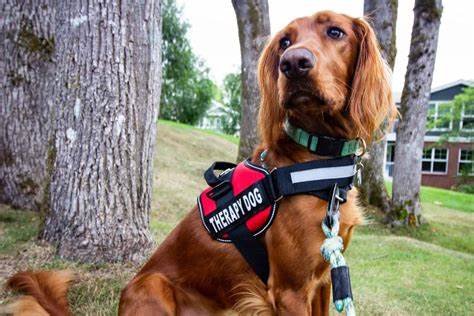The Best Breeds for Therapy Dogs
Therapy dogs play an essential role in supporting individuals with mental health challenges, offering comfort, emotional support, and physical assistance. While any breed has the potential to be a therapy dog, some are better suited to the demands of the role. These dogs are typically calm, empathetic, and easy to train.
Labrador Retrievers: The Classic Choice
Labrador Retrievers are one of the most popular therapy dog breeds. Their calm demeanor, intelligence, and eagerness to please make them ideal for a variety of therapy roles. Labradors are also patient, tolerant, and friendly, which makes them particularly effective in settings like hospitals, schools, and nursing homes.
Golden Retrievers: Gentle and Affectionate
Golden Retrievers are another favorite for therapy dog work. They are known for their loving nature and ability to connect emotionally with people. Their gentle temperament and obedience make them highly trainable and well-suited to providing comfort in therapeutic environments. Golden Retrievers are often found in settings where emotional support is needed, such as therapy sessions for children or veterans.

Poodles: Smart and Adaptable
Poodles, whether Standard, Miniature, or Toy, excel in therapy dog work due to their intelligence and adaptability. They are highly trainable and can quickly learn specific commands and behaviors necessary for therapy work. Poodles are also hypoallergenic, which makes them a great choice for individuals with allergies, ensuring that they can provide support without causing additional health issues.
Cavalier King Charles Spaniels: Small But Mighty
Despite their small size, Cavalier King Charles Spaniels are incredibly gentle, affectionate, and friendly, making them excellent therapy dogs. They are especially effective with children and elderly individuals, providing calm and comfort with their gentle presence. Their easygoing nature and eagerness to be around people make them ideal for close, personal interactions in therapy settings.
German Shepherds: Loyal and Protective
German Shepherds are widely recognized for their loyalty and protective instincts, which makes them highly suitable for therapy dog work, especially in environments requiring a bit more assistance, such as in prisons or for individuals with PTSD. Their trainability and intelligence are key factors that help them succeed in therapy roles, where they can provide not only emotional support but also protection when necessary.
Beagles: Friendly and Approachable
Beagles, known for their friendly and easygoing nature, can be wonderful therapy dogs. They are particularly great with children, offering a fun and comforting presence. Beagles’ curious nature and affectionate temperament allow them to bond quickly with people, providing emotional support in various therapeutic settings.
Boxers: Energetic and Affectionate
Though known for their energetic nature, Boxers are also incredibly affectionate and protective. They can be excellent therapy dogs, especially when they are trained to channel their energy positively. Boxers thrive in environments where they can interact with children and adults alike, offering emotional support while keeping a playful and engaging demeanor.
Conclusion
When it comes to choosing the best breed for a therapy dog, personality, temperament, and trainability are key factors. Whether it’s the calm and steady nature of a Labrador or the affectionate demeanor of a Cavalier King Charles Spaniel, therapy dogs are invaluable companions who provide essential support. Each breed brings its unique qualities, ensuring that there’s a perfect therapy dog for every individual in need of emotional assistance.








